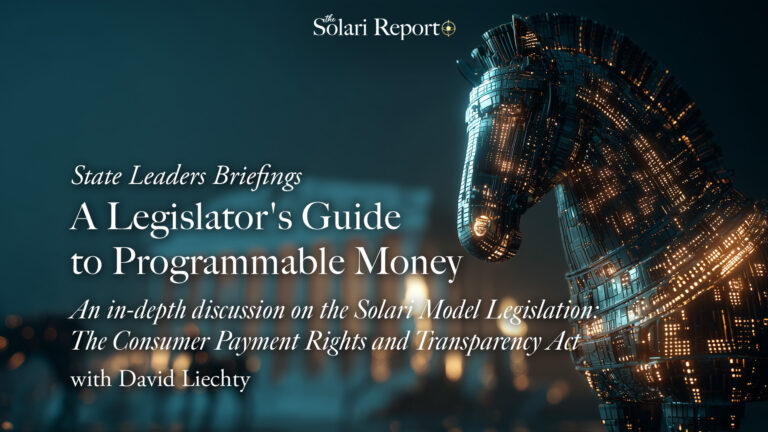
Listen to the MP3 audio file
The Solari Report – 26 Dec 2008
The global financial bubble burst in 2008 — and that’s a good thing. It means that the bubble economy will stop draining the real economy. Instead of capital being invested in fraudulent mortgage securities, derivatives portfolios, and companies running black-box ponzi schemes, perhaps it can be used to finance real solutions to the problems before us. Now we can talk about the real world and real issues: there are many worth addressing.
The big question of 2008 is “Where is the money?” It just keeps disappearing. There was $4 trillion plus that disappeared from the US government between 1998 and 2002 along with the pump-and-dump of the Internet and telecom stocks and Enron. Since then and into 2008, funds keep disappearing into the Afghanistan and Iraq campaigns. Now we have $700 billion in bailouts and $7 trillion plus in loans by the Fed, not to mention the $5 trillion in mortgage market liabilities assumed by the Federal government with the passage of the Housing and Economic Recovery Act of 2008. The fraud in the US mortgage bubble was clearly enormous. But, where did all the money go?
The global financial meltdown that some market pundits predicted hasn’t happened. Instead, the “Slow Burn” continues. But, investor losses have been significant. The result has been an outbreak of healthy distrust which has resulted in the freezing up of the global financial system. Because they are not leveraged, pension fund losses have been relatively quiet. Look for reports regarding pension fund performance to have a profound impact in 2009.
What this all adds up to is financial coup d’état. Trillions are being stolen through the financial system in a manner that centralizes wealth, leaving governments bankrupt but with bigger budgets to assert control over the wider population. Not surprisingly, this leaves economies ever more dependent on defense and enforcement spending as the infrastructure of central control grows.
One of the biggest stories in 2008 was the continuing censorship of stories about manipulations harmful to our health, including chemtrails, the efforts to control the food and seed supply, and the ongoing suppression of energy technology. Watch for a continued failure of traditional media in 2009 … and a continuing loss of market share due to public disgust at such censorship. Go, Wikileaks!
The Good News
One of the few good investment categories in 2008 was building local self-sufficiency. From the success of the Financial Permaculture conference in Hohenwald, Tennessee to the rapid spread of Transition Towns around the world, to the spreading of participatory budgeting from Latin America, efforts by local communities to re-localize are very encouraging. The logical response to uneconomic centralization is to look for ways to decentralize. Despite all the difficulties in the economy, entrepreneurs doing natural home building, farmers markets, starting farms, installing solar energy and weatherizing homes enjoyed a market moving their way. These efforts will continue to grow well beyond any shakeout.
In this week’s Solari Report (Friday, December 26), I’m doing a year-end “wrap-up” looking back at events in 2008 and discussing what they mean to our future. Here’s an outline:
– The Slow Burn
– Bailouts: Where’s the Money?
– Financial Coup d’état
– The Crash in Commodities: Temporary or Permanent?
– The Freezing Up of the Global Financial System
– Election 2008: The First Billion Dollar Candidate
– Russia, China, and the Middle East Rising
– Pension Fund Time Bomb
– The Shake-Out Moves into 2009
You can learn more about The Solari Report and subscribe here. We’ve completed (2) reports thus far and subscribers can access our complete archive of MP3 files.
I hope you’ll join us.
Note: Solari Report subscribers can now listen to Catherine’s discussion of this topic via MP3 recording. You can subscribe monthly or annually here.





















































































































On June 5th 2007 FICO credit scoring rules were changed. I your opinion, do you feel that was good timing? I think it was sort of strange how that happen and in 2008 we are all of a sudden in a “Credit Crisis”. I have not heard any media outlets like Coast to Coast, NPR’s Planet Money or Trends report on it.
What say you?
Thanks for looking at this..
JD Daniels
You have me concerned but not yet anticipating doomsday. I am new to the blog and am still trying to decipher your explicit solutions. You are way over my head but I still manage to get bits and pieces that make sense. We somehow have to get through these tough times and look for the light at the end of the tunnel. It has happened before and will happen again. Hopefully, with insight such as yours, we will be better prepared.
By the way, the $4 trillion is in China. How do you think the government is getting all the bail out money?
Jeffrey:
I have occasionally wondered if the FICO credit scoring changes were another sign that we may be in an intentional “dump” — as part of a pump and dump. If you point me to a good article or commentary on it, I will post.
One thing worth doing would be to collect anecdotal evidence that the dump is intentional. I shall add to the parking lot!
Catherine
Pete:
IMO — The Fed is running down assets, printing and proposing to borrow. The Treasury is borrowing (on balance sheet and off balance sheet) and, I suspect, through the Exchange Stabilization Fund, generating insider trading revenues.
And of course, they are borrowing back from China et al and the central banks who are playing the same games.
You really should read http://www.dunwalke.com. If you will read it over Xmas, I will map out the local economy for you and how we might go about addressing “relocalization.
🙂
Catherine
HOW TO HAVE EFFICIENT GOVERNMENT AGENCIES: A budgeting proposal
There is a way to cut almost any state agency or department in half in about three years, with employees cooperating enthusiastically and willingly.
Most government agencies propose their own budgets for each fiscal year, and each new one is almost always larger than the current budget. Most agencies make sure that the current year’s budget has been spent by the end of the fiscal year. They don’t want to lose their funding. There is no incentive for savings under this system.
There should be a new budgeting policy for each department that would take any unspent, budgeted funds at the end of the fiscal year and split them among the people in the department. Then, the lower budget figure would be used for the next fiscal year, with, again, any unspent surplus being distributed to the employees who made the surplus possible. Personal interest would have every employee watching for any possible waste. Retiring employees would not be replaced, and hiring of new personnel would be almost eliminated.
No money would be saved the first year, but after that, every department would have continuously lower budgets.